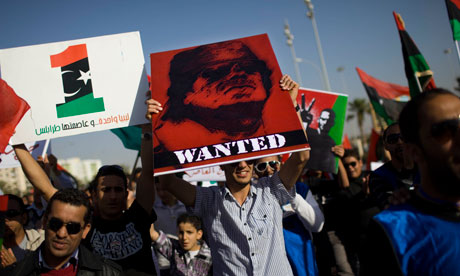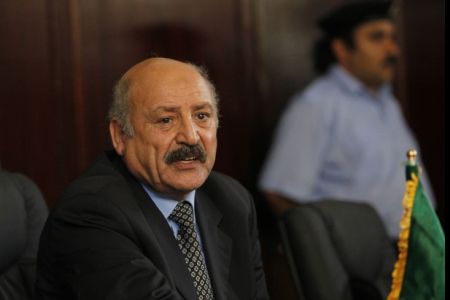Libya has accused NATO of killing more than 1,100 civilians in its air strikes in support of rebel forces since the end of March.
| Libyan prosecutor general Mohamed Zekri Mahjubi |
Libya has accused NATO of killing more than 1,100 civilians in its air strikes in support of rebel forces since the end of March.
Libyan prosecutor general Mohamed Zekri Mahjubi told foreign journalists in Tripoli he was seeking to prosecute NATO chief Anders Fogh Rasmussen in Libyan courts for "war crimes".
"As NATO secretary general, Rasmussen is responsible for the actions of this organization which has attacked an unarmed people, killing 1,108 civilians and wounding 4,537 others in bombardment of Tripoli and other cities and villages."
Apart from war crimes, Mahjubi accused Rasmussen of trying to kill Libyan leader Moamer Gaddafi, "deliberate aggression against innocent civilians" and of "the murder of children."
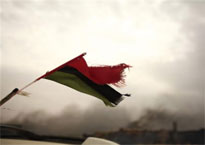 Also, the NATO chief stood accused of "trying to overthrow the Libyan regime" and replace it with a rebel movement under its control to "take over the wealth" of oil-rich Libya.
Also, the NATO chief stood accused of "trying to overthrow the Libyan regime" and replace it with a rebel movement under its control to "take over the wealth" of oil-rich Libya.
On Wednesday, Libyan rebels repulsed loyalists who had retaken the desert hamlet of Gualish and chased them to the outskirts of Asabah, shelling the town from nearby hills, an AFP correspondent said.
The rebel breakthrough came as an insurgent commander downplayed talk of a political solution, saying Gaddafi refuses to go.
Dug in on the hills above the town on the highway to Tripoli, the rebels were firing heavy and small arms and loyalist troops were responding with Grad rockets, said the correspondent, embedded with the rebels.
 Asabah is strategically located 80 kilometers (50 miles) south of the capital, serving as the last barrier between the rebels and the garrison town of Gharyan.
Asabah is strategically located 80 kilometers (50 miles) south of the capital, serving as the last barrier between the rebels and the garrison town of Gharyan.
Earlier on Wednesday, the pro-Gaddafi troops had caught rebels off guard and attacked Gualish, which the insurgents captured a week earlier, seizing nearly all of it.
But rebels poured in from surrounding villages and besieged the hamlet, driving the loyalists out and chasing them up the road toward Asabah, some 17 kilometers (11 miles) away.
As the fighting raged in the Nafusa Mountains, a rebel commander in the area said a peace deal was "impossible" because Gaddafi refuses to step down.
"Up to now it is impossible to get a political solution. Gaddafi wants to stay; the rebels don't want," said Colonel Juma Brahim, head of the rebels' operational command for the region.
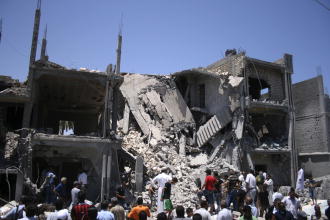 "To the last moment Gaddafi is looking for a peace solution because he is weak, all the soldiers and equipment are coming to our side one by one," Brahim said.
"To the last moment Gaddafi is looking for a peace solution because he is weak, all the soldiers and equipment are coming to our side one by one," Brahim said.
US Secretary of State Hillary Clinton, meanwhile, said at a joint news conference in Washington with Russian Foreign Minister Sergei Lavrov that Gaddafi's "days are numbered" after signs of advances on the field by rebels.
"Although neither of us can predict to you the exact day or hour that Gaddafi will leave power, we do understand and agree that his days are numbered," the chief US diplomat said.
"We will continue to work closely with our international partners including Russia to increase the pressure on him and his regime," Clinton said.
Lavrov played down differences with Clinton over Libya, saying: "We have less misunderstanding with the United States than with some European countries."
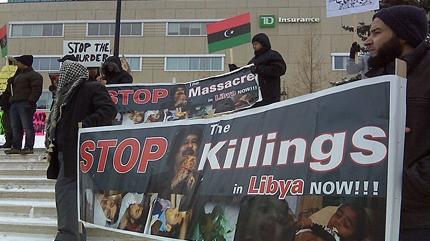 "We are united in that we have to start a political process as soon as possible," Lavrov said. "We have different channels, official and not so official."
"We are united in that we have to start a political process as soon as possible," Lavrov said. "We have different channels, official and not so official."
However, the Russian foreign ministry said earlier Wednesday that Moscow would not take part in upcoming discussions on Libya to take place later this week in Turkey, which has also seen itself as a mediator in the conflict.
On Tuesday, French and Libyan officials talked up the chances of negotiating Gaddafi's withdrawal from power and an end to the conflict still wracking the country after months of military stalemate.
Before the latest counter-attack, the rebels in the Nafusa Mountains already faced a tough task in trying to take Asabah, even with allies inside the town fomenting revolution and spies providing intelligence on enemy positions.
While they have been buoyed by a clutch of victories in the mountains, Asabah is home to prominent families close to the regime.
It has a large military base and a population faithful to the regime. The Libyan leader felt comfortable enough to have a country house there.
Since the rebels took Gualish on July 6, they have been awaiting "the green light from NATO" to advance.
"We don't know when but there will be a battle," said Brahim, the rebel colonel.
